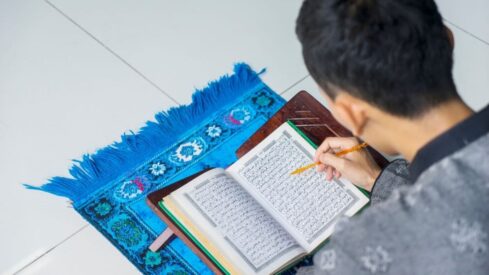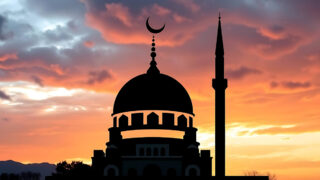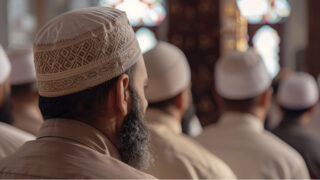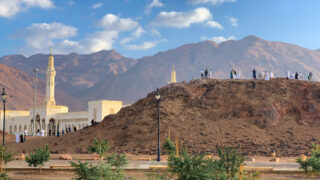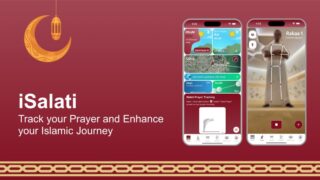From Washington DC to California
I would like to start the story of how I became Muslim with a bit about my background prior to embracing Islam. I come from a white, upper-middle-class Anglo Saxon American family from Washington DC. Growing up I would accompany my parents to soiree’s, potato-salad laden outdoor luncheons at friends’ houses and church on Sundays. My parents were very well educated and both successful in their respective fields. My days were spent in a coat and tie at private schools. I was not exposed to much diversity, unless by diversity you mean different kinds of rich white people.
Despite my excellent education, I certainly had little real understanding of how people from other countries or other religions perceived the world. I was religious as a child, but I did not care too much about the Protestant doctrine my Sunday school teachers tried to teach their students. I was religious, I suppose, because I believed in God in the same way so many people in this world do: I called upon Him when I needed Him, pledging my undying service and devotion if only He’d grant me whatever wish I desperately wanted at the time, only to forget Him later. But I suppose I really did believe in God, for throughout my life I always knew that some higher truth existed and going off to California for boarding school further constricted the role of religion in my life. My father could no longer make me go to church, and California’s rich and liberal environment has never been known to welcome any religious expression other than vapid adulterations of Eastern faiths such as Buddhism and Hinduism. When a teacher at my school suggested having a private Bible study at his house after formal dinner for any students interested he drew criticism from faculty and students alike.
With such issues cast aside, then, I spent my high school days studying, drinking when I could and desperately trying to hook up with whatever female would let me near her. Time slipped by as my friends and I knocked tennis balls back and forth in the warm California sun, hoping to impress girls and reaping the inevitable heart-aches with which spoiled youths are constantly stricken. Beyond my English classes, clumsy attempts at getting drunk and days at the beach I knew in both my heart and mind that my life was not complete. I knew, with perhaps too much perspicacity, that all the fleeting delights of my life and all its momentary agonies could come to an end with the wrong turn on a highway or a freak accident. I knew that all my hopes and dreams as a person had to have more significance than simply the transitory whims of an animal born and bound to perish without history even noticing. I knew all this, so I kept looking for the truth that could grant my life meaning.
Encountering Islam
Soon I went off to college. There, among stacks of required readings and friends smart and arrogant enough to provide stimulation conversation for each other, I pondered these questions. Motivated and excited by my classes, my mind was always racing from thinker to thinker, from book to book. My university had a theology requirement, so I decided to take a class on Islamic Thought and practice. My professor was a Palestinian Muslim woman who made no apologies for her faith. She presented Islam in a fair and reasonable light, stating on the first day of class that she expected her students to “step into the shoes of a Muslim in order to understand Islam.” I was initially averse to sympathizing for a religion spread by the sword and so closely associated with terrorism, and I took every opportunity I could to argue with the professor about the merits of the religion. As the semester progressed, however, I found myself identifying more and more with the image of Islam that she presented: One God, totally beyond our comprehension, the Creator and Shaper of a rational and ordered universe; a message sent from on high, over and over again to the various human communities that had thrived on and then vanished from the earth; men corrupting this message out of the desire to hasten felicity, out of greed or the lust for power; one last messenger, sent to the dry earth of Arabia, that Near-Eastern crucible of human faith, to deliver the pronouncement one last time; God is, and you must worship Him, when you do, you will be free from fear and pain, and all the trials and vicissitudes of this life will gain meaning; one last book, intact, preserved for all time for the generations that would ponder it as the centuries passed.
Surrendering to God
This was the God I had believed in as a child, the God and the message cleansed of human accretions and worldly corruptions. This was the message that sat peacefully both in man’s heart and mind, bringing reason and faith together in submission to God. Yes, the manifestation was foreign; I knew no Arabic, barely understood the world into which the Qur’an was revealed and could hardly grasp the manifold transformations that would affect the Islamic tradition as time and space moved Muhammad’s revelation away from its origins. Nonetheless, I felt that I had alighted upon the truth that had evaded me for so long and that at last my nagging fears and doubts had come to an end. I spent the summer traveling in Europe and Russia and was able to ponder these questions with the seriousness and depth that only long hours of traveling afford. When I returned home to Washington to start my sophomore year of college, I decided that I had already become Muslim. I believed in God’s message, as delivered through the Prophet Muhammad, and all that remained was to formalize my commitment and begin living as a Muslim. I had already weaned myself off liquor and, quite unwillingly, put a stop to my attempted womanizing. I said the shahada (testimony of faith) in front of some of the Muslim friends I had made while learning about the religion and began to pray. God made this transition very easy for me. My family gradually understood the change that had occurred in my life, and they have never been anything but supportive and sympathetic. They are very result-oriented; when they saw that I no longer came home drunk or acted like an idiot they realized that my life had improved.
Little can be compared to the euphoria of those first days. With every step I took and every glance at the green trees around me I felt that I had begun life anew. My life and everything in it took on a new purpose. Gone were the doubts and fears of yesteryear. All I wanted to go was serve God and worship Him…all I asked was that He grant me peace in this world and the next. I continued to take classes on Islam and gradually focused on Middle Eastern history. As my college career continued it occurred to me that studying and research were my forte and that pursuing graduate studies in the study of Islam and Islamic civilization would allow me to best serve God.
Understanding Islam
But I suppose I had another reason. It is difficult to explain to someone who has not experienced it, but Muslims have long conflated culture and religion. As a convert to Islam it is thus very difficult to distinguish between Arab, Indian or Iranian culture and the actual faith and practices of Islam. Moreover, Muslims have not exactly carried themselves well in the modern era. Their societies and states are poor, uneducated, backward, decadent, and torn by pathetic and pedantic racial or class conflicts. In addition, it is difficult to know when a Muslim is actually committed to their religion, when he is just waving it as some kind of flag to make himself feel better in a world in which secularism, modernity and the West have become paramount. Studying the history and development of the Islamic community helped me answer the important questions “How should I live as a Muslim in the modern world? What elements of Islamic tradition are authentic and which are just the cultural additions of Muslim cultures?”
These problems are all interesting, but the Muslim ailment that has affected me most personally is the parochial visions of marriage that abound in the Muslim world. In Islam race should mean nothing. A person’s merit is determined by their belief in God, good deeds, and character alone. Unfortunately, many Muslims are overly concerned with race when it comes to marriage. Whether they are Muslim immigrants in the United States or families that have remained in their countries of origin, an alarmingly large percentage of Muslim parents are only interested in marrying their children to members of their ethnic community. Syrian immigrants in the United States want their children to marry other Syrians, Indian Muslim immigrants want their children to marry Indian Muslims, etc. This is all well and good for those people involved, but it presents somewhat of a dilemma for an American convert to Islam.
This attitude is completely antithetical to the original spirit of Islam. The Prophet Muhammad was cast out of his hometown of Mecca because his preaching irked the city’s elite. He was welcomed in the city of Yathrib by noble folk who had embraced his message. As more and more Meccans converted, they made the journey to Yathrib, newly named al-Medina, to be welcomed into an emerging believing community. The Prophet wove these new emmigrants into the fabric of the community and, although tribal divisions did remain, the fraternity of Islam trumped them. Like these early immigrants I long to be accepted and welcomed into a Muslim family.
Nonetheless, these problems amount to little when compared to the blessings that God has given me as a Muslim. He has allowed me to explore new peoples and cultures far removed from the white suburban fences and gin-and-tonic cocktail parties of my youth. He has given me a passion for learning and a mission to fulfill in contributing to man’s understanding of history and the world of Islam. He bestowed dignity upon me by leading me away from habits and vices not befitting an upstanding man. He has given my life meaning and saved me from the fear that plagues those whose mortality and life styles haunt them. He has given me brothers and sisters in faith who have embraced me as one of their own.
By Jonathan Brown


